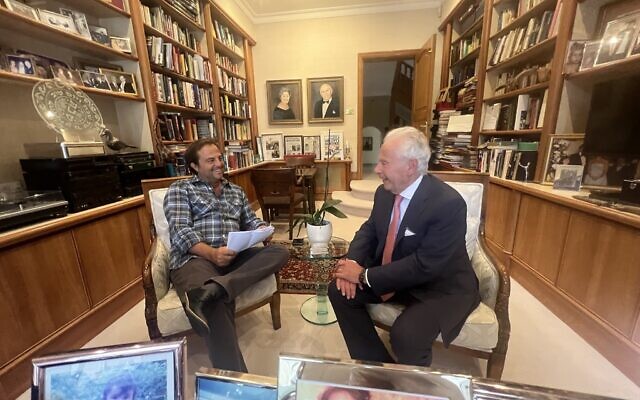‘I don’t get on with everyone but I’m a straight talker… when I shake hands, that’s it’
Lord Levy could teach Facebook a thing or two about social networking. Richard Ferrer goes head-to-head with the fundraiser extraordinaire... on and off the tennis court.
Richard Ferrer has been editor of Jewish News since 2009. As one of Britain's leading Jewish voices he writes for The Times, Independent, New Statesman and many other titles. Richard previously worked at the Daily Mail, Daily Mirror, edited the Boston Jewish Advocate and created the Channel 4 TV series Jewish Mum Of The Year.
Lord Levy, it turns out, is a bit of a hoarder. His home office is an Aladdin’s cave of artefacts and antiques, accumulated over the course of half-a-century of handshakes.
There are certificates, doctorates, newspapers and gold discs from his time as a record label boss. There’s a rare travel guide to Ottoman-era Palestine, dated 1852, a pair of swords – from late Venezuelan president Hugo Chávez and the late Sultan of Oman, Qaboos bin Said, and pictures upon pictures upon pictures.
There he is with Queen Elizabeth, King Charles, Bill Clinton, Yitzhak Rabin, Kofi Annan, Mahmoud Abbas, Gordon Brown and Rabbi Lord Sacks (not all together). There’s another of him shaking hands with Yasser Arafat, looking slightly concerned he might not get his hand back. And, inevitably, with his old mate Tony Blair – the man he fundraised into Downing Street who, despite media reports of a falling out, remains a close friend.
And sitting above them all, literally and lovingly, are two quite mesmerising portraits of his late parents, Samuel and Annie – who during our conversation the 78-year-old affectionately calls “mummy and daddy”.
I arrive early and am led into Michael’s man cave by Gilda, or “Gill” as her husband of 55 years calls her.
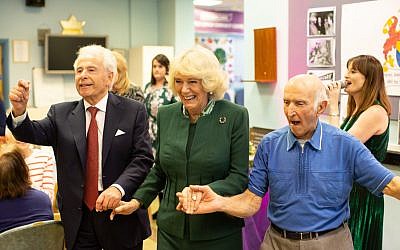
Michael soon enters with customary elan, impeccably turned out in a blue suit with matching pocket square and a pink tie. He gives me one of his signature warm pats on the cheek and takes a seat, not behind a desk strewn with family photos but the armchair opposite, so close our knees almost knock.
We’d last spoken the previous month when I’d guessed how much Michael has fundraised in 50 years. “£100million?” I ventured, not wishing to offend with a modest total. It turns out I’d missed a zero or two. Over half a century, Baron Michael Levy of Mill Hill has raised a boggling £1billion for causes close to his heart.
Michael speaks in a soft, almost affectionate tone – as if confiding in a good friend rather than a journalist he’s met a handful of times. It’s an intoxicating talent.
So, let’s begin with the obvious question. How do you go about raising the gross domestic product of a small nation state? It can’t all be down to a solid handshake and megawatt smile. “It’s about looking people in the eye,” says Michael, looking me in the eye. “It’s about calming concerns, giving straight answers and being honest and well informed. Asking for donations – for a charity or political party – is a matter of trust and respect. I try to never let people down.”
Michael speaks in a soft, almost affectionate tone – as if confiding in a good friend rather than a journalist he’s met a handful of times. It’s an intoxicating talent. I almost reach for my debit card.
“I started in my mid 20s, so I’ve been at it a very long time. You can’t fundraise for 50 years without being able to go back to the same people year after year, so you can’t be impatient. I’ve always been able to relate to people and like to think people relate to me. Not that I get on with everyone, but I try to be absolutely straight. When I shake hands, that’s it.”
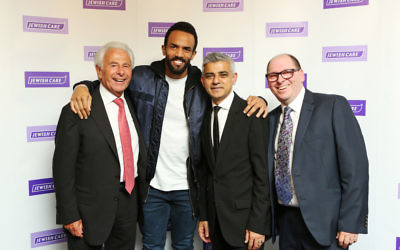
Michael says one of his proudest achievements is making Jewish charity executives’ salaries competitive across the sector. The highest paid employee at Jewish Care, where he is life president, earned more than £170,000 in 2019. “If you want the right people in responsible positions you have to pay them highly,” he says. “The community’s charities now attract the most talented people. It’s still not entirely competitive with some top commercial roles but it’s heading in the right direction.”
Jewish charity bosses certainly earned their keep during Covid. “Those early days of lockdown were a time of deep confusion,” he recalls, rubbing his forehead, appearing fraught at the thought. “People were being sent back from hospital without tests and we didn’t have enough PPE to take care of staff.
“Our chief executive, Daniel Carmel Brown, and his care home teams were just remarkable – working around the clock. It soon became clear this emergency required extra funding, not just for Jewish Care but other Jewish charities like Nightingale who faced similar issues. So, we fundraised for them all. £5million in one-week, shared between the charities. The community rose to the challenge quite brilliantly.
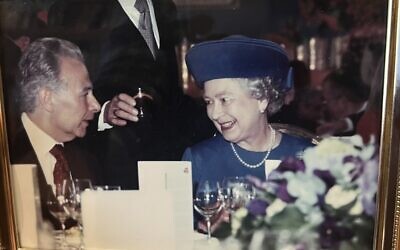
“At that time, in early 2020, I began our Zoom calls with a prayer for one of my closest friends, Michael Goldmeier, who had Covid. There he is,” Michael says, pointing to another of his framed pictures. “Michael was a dear friend for 50 years and a former chairman of Jewish Care. He was here in my home for Shabbat dinner in early March. One week later he became unwell. One week later he was in hospital and one week after that he passed away. His passing made the communal care campaign even more personal for me.”
Does this joint effort in combating Covid point the way to communal organisations working as one in future? “Well,” he says, an eyebrow raised. “That’s easier said than done. We’re a small community with too many organisations so, yes, we should cut back on duplication and overheads to put more into the provision of services. But, making that a reality, well…” Michael uncharacteristically leaves that sentence hanging in the air.
Look at the Board’s makeup. It claims to be democratic, but its representation barely change year after year.
Regarding coordination, or even a merger, between the Board of Deputies and Jewish Leadership Council, Michael is surprisingly blunt. “If Jewish Care, Nightingale or the Community Security Trust suddenly disappeared, it would have a devastating impact on the community. Do you honestly think if the Board of Deputies or Jewish Leadership Council vanished it would make such a difference?
“Look at the Board’s makeup. It claims to be democratic, but its representation barely change year after year. I’m not criticising individuals at the Board or JLC. (Board president) Marie van Der Zyl and (JLC chair) Keith Black are impressive, hardworking leaders. I respect what they do but I’m not sure much of it is relevant.”
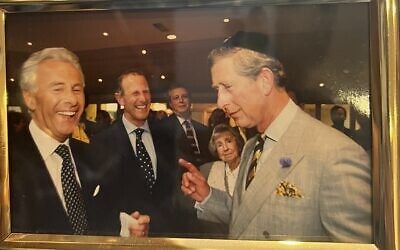
Tough talk from a man who helped launch the JLC in 2003. “Back then I didn’t imagine it would grow to its current size, with so many member branches,” Michael admits. “It now duplicates a lot of the Board’s work and makes those outside the community wonder: who do I go to? To the Board, with its historic relationship with government going back centuries, or the JLC, which has impact and influence in a different way. It’s created a foggy situation which, in a small community like ours, is unhelpful. There needs to be clarity and transparency, so the government knows who it is dealing with.”
Michael has also faced daunting challenges as president of JFS, Europe’s biggest Jewish comprehensive school, which was recently taken out of special measures following a tragic period in which three pupils took their own lives and more than 6,000 people signed a petition urging the school to prioritise mental health.
At its lowest ebb, Ofsted identified “deep-rooted and widespread failings in the school’s safeguarding culture”. The transformation under new headteacher, Dr David Moody, has been swift and successful, with students last month celebrating superb GCSE and A-level results.
“JFS has been through a tough time. There were tragic days, wonderful young lives were lost, and this impacted us all deeply.
“JFS has been through a tough time,” Michael reflects. “There were tragic days, wonderful young lives were lost, and this impacted us all deeply. We now have an excellent new headteacher and recent results have been outstanding.
“It’s taken a lot of time and energy, led by our chair of governors, governing body and me in the background as president, to put the school back on the right footing. I speak to the head teacher every week and from everything I’m hearing the parents are starting to have their belief and confidence in the school restored. JFS has an exciting future.”
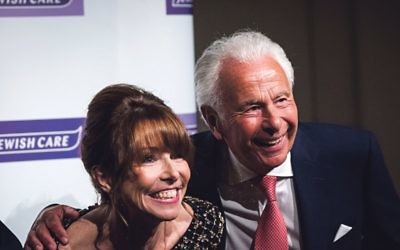
Before moving away from matters communal, Michael, unprompted, is scathing about the clandestine ownership of the Jewish Chronicle. In 2020, an anonymous £2.2million bid derailed a community-backed merger with Jewish News at the eleventh hour. Two years later and the owner’s identity remains closely guarded (even the newspaper’s editor claims to be in the dark).
The motive for such a cloak-and-dagger routine has also raised concerns (the only named shareholder and director is former Downing Street spin doctor Sir Robbie Gibb, who fronted the bid). “We know who owns our national newspapers, but our community knows nothing about the ownership of a newspaper that is meant to serve us, not keep us in the dark,” Michael says. “Such lack of transparency is disturbing and, frankly, dangerous.
Michael is scathing about the clandestine ownership of the Jewish Chronicle, saying: “Such a lack of transparency is disturbing and, frankly, dangerous.”
“We all see what the newspaper’s politics now are. What its world view has become. It might as well be written at Tory Party HQ, which doesn’t go unnoticed by the Labour Party. Well, the Tories won’t be in power for ever, that’s for sure.”
Indeed. Even staunch Conservatives concede the Opposition is now more electable than at any time since New Labour – an era Michael did so much to engineer.
He first came to national prominence as Tony Blair’s chief fundraiser – cruelly dubbed “Lord Cashpoint” by the tabloids – and later served as his personal envoy to the Middle East. So, all eyes were on him during the darkest days of Jeremy Corbyn’s leadership. How close did he get to quitting the party?
Michael pauses. “Very close. Tony told me to stay in the party. He said things would turn around and I needed to hold my ground and see it through. My family said the same. But yes, it was an incredibly difficult time. Nobody was more vociferously critical of Corbyn than me and I paid a price in the party. My life was threatened.”
Michael’s patience was rewarded at the 2019 general election when Corbynism collapsed under the weight of its own delusions. New leader Keir Starmer pledged from day one to make the party a home for Jews once more. Marks out of 10 so far?
Nobody was more vociferously critical of Corbyn than me and I paid a price in the party. My life was threatened.
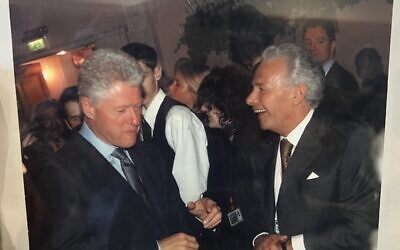
“I won’t give Keir a score. The key question is – did he set out with genuine sincerity to eradicate antisemitism? I have no doubt that’s precisely what he did. He was determined from to deal with the issue. He is a brave and honest man with an absolute moral compass. A man of dignity and principle. He could be making a fortune as a barrister but has given his career to his country. He will make an excellent prime minister.
“There will always be elements of antisemitism in politics, but do I wake up in the morning thinking there’s an antisemite in my cupboard? No, I don’t. I wear my identity with pride. I am a privileged guy and everything I’ve achieved in life has been as a proud Jew.”
We meet the day Liz Truss becomes prime minister. Was Starmer happy to see the back of Boris Johnson, a consummate election winner and media performer? “Keir has every chance of becoming the next prime minister,” Michael predicts. “That makes him bad news for any Tory leader, be it Johnson or Truss. Keir is ready for an election before 2024, but I doubt that will happen – despite Liz Truss having no mandate.”
Should Andy Murray follow Roger Federer and retire? ‘No, but his best days sadly are behind him.’ Will Emma Raducanu win another Grand Slam? ‘Probably not. Let’s just say her determination on court hasn’t been matched by her determination off it.’
He continues: “Keir will always have critics in our community; the same critics who don’t dare condemn the Tories. During the Conservative leadership campaign our new prime minister attacked the ‘woke civil service culture that strays into antisemitism’ and called Jews ‘business orientated’. The silence in the community to those words was deafening. Where was the criticism? Only the head of Union of Jewish Students had the gumption to take her to task.”
Michael also has high regard for what he calls Starmer’s “government in waiting”. He says: “Rachel Reeves (shadow chancellor) has a fantastic financial mind, David Lammy (shadow foreign secretary) and Yvette Cooper (shadow home secretary) are honest and genuine people and I’m close to Wes Streeting (shadow health secretary), who is a first-class guy. We have a very good front bench. They are ready to assume power.”
Keir Starmer will always have critics in our community; the same critics who don’t dare condemn the Tories.
On the passing of the Queen, who dies two days after we meet, Michael later reflects: “She truly understood that there are differences between peoples, but that there is much more that unites us. That sense of harmony, which has served this nation well during some difficult times, most certainly radiated through every interaction with her.”
Looking back on his career – Michael is 13 years beyond retirement age but shows no sign of slowing down – what does he consider his proudest achievements? “Helping create Jewish Care; seeing JFS go from a building site to what it is today – tantamount to a university campus; witnessing the growth of JLGB and how brilliantly it pivoted during the pandemic. These are highlights. I hope my contribution has helped make our community stronger.”
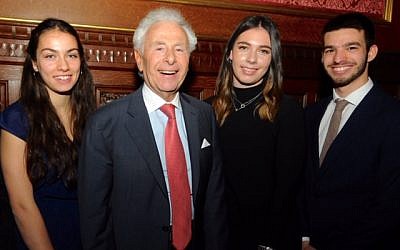
After chatting for an hour, Michael gives me a tour of his north London home, past the swimming pool where he aims for 40 lengths each morning, beyond the idyllic koi fishpond and on to his beloved Astroturf tennis court, where he plays three times a week.
Should Andy Murray follow Roger Federer and retire? “No, but his best days sadly are behind him.” Will Emma Raducanu win another Grand Slam? “Probably not. Let’s just say her determination on court hasn’t been matched by her determination off it.” I mention my half-decent forehand and Michael invites me back the following Sunday for a game. He wins 6-3.
I phone Michael the next day. Not to request a rematch (I have no answer to his backhand slice) but to fact check a few of the items in his office. For a minute or two, all I hear is the clatter and thud of objects being picked up and moved about.
Eventually, he pipes up: “Oh Lord, I didn’t realise we had so much bloody stuff. Gill, We need a tidy up!”

Thank you for helping to make Jewish News the leading source of news and opinion for the UK Jewish community. Today we're asking for your invaluable help to continue putting our community first in everything we do.
For as little as £5 a month you can help sustain the vital work we do in celebrating and standing up for Jewish life in Britain.
Jewish News holds our community together and keeps us connected. Like a synagogue, it’s where people turn to feel part of something bigger. It also proudly shows the rest of Britain the vibrancy and rich culture of modern Jewish life.
You can make a quick and easy one-off or monthly contribution of £5, £10, £20 or any other sum you’re comfortable with.
100% of your donation will help us continue celebrating our community, in all its dynamic diversity...
Engaging
Being a community platform means so much more than producing a newspaper and website. One of our proudest roles is media partnering with our invaluable charities to amplify the outstanding work they do to help us all.
Celebrating
There’s no shortage of oys in the world but Jewish News takes every opportunity to celebrate the joys too, through projects like Night of Heroes, 40 Under 40 and other compelling countdowns that make the community kvell with pride.
Pioneering
In the first collaboration between media outlets from different faiths, Jewish News worked with British Muslim TV and Church Times to produce a list of young activists leading the way on interfaith understanding.
Campaigning
Royal Mail issued a stamp honouring Holocaust hero Sir Nicholas Winton after a Jewish News campaign attracted more than 100,000 backers. Jewish Newsalso produces special editions of the paper highlighting pressing issues including mental health and Holocaust remembrance.
Easy access
In an age when news is readily accessible, Jewish News provides high-quality content free online and offline, removing any financial barriers to connecting people.
Voice of our community to wider society
The Jewish News team regularly appears on TV, radio and on the pages of the national press to comment on stories about the Jewish community. Easy access to the paper on the streets of London also means Jewish News provides an invaluable window into the community for the country at large.
We hope you agree all this is worth preserving.


